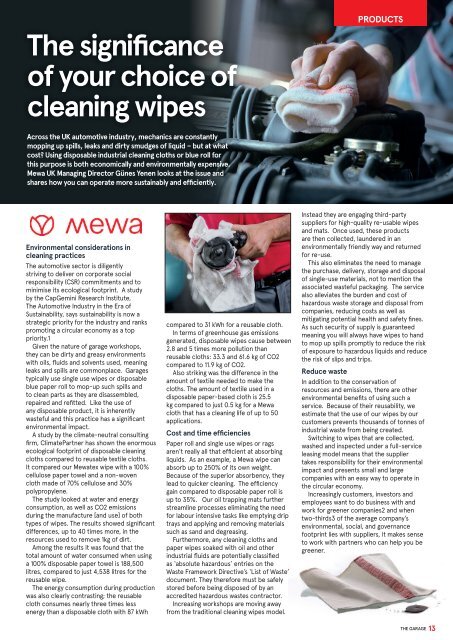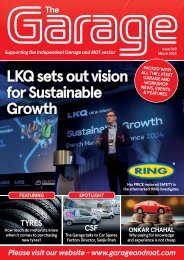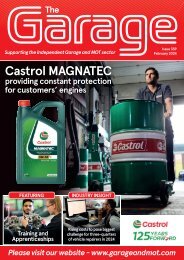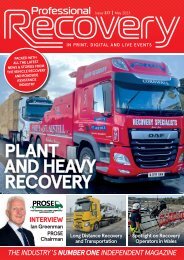The Garage 354
Create successful ePaper yourself
Turn your PDF publications into a flip-book with our unique Google optimized e-Paper software.
PRODUCTS<br />
<strong>The</strong> significance<br />
of your choice of<br />
cleaning wipes<br />
Across the UK automotive industry, mechanics are constantly<br />
mopping up spills, leaks and dirty smudges of liquid – but at what<br />
cost? Using disposable industrial cleaning cloths or blue roll for<br />
this purpose is both economically and environmentally expensive.<br />
Mewa UK Managing Director Günes Yenen looks at the issue and<br />
shares how you can operate more sustainably and efficiently.<br />
Environmental considerations in<br />
cleaning practices<br />
<strong>The</strong> automotive sector is diligently<br />
striving to deliver on corporate social<br />
responsibility (CSR) commitments and to<br />
minimise its ecological footprint. A study<br />
by the CapGemini Research Institute,<br />
<strong>The</strong> Automotive Industry in the Era of<br />
Sustainability, says sustainability is now a<br />
strategic priority for the industry and ranks<br />
promoting a circular economy as a top<br />
priority.1<br />
Given the nature of garage workshops,<br />
they can be dirty and greasy environments<br />
with oils, fluids and solvents used, meaning<br />
leaks and spills are commonplace. <strong>Garage</strong>s<br />
typically use single use wipes or disposable<br />
blue paper roll to mop-up such spills and<br />
to clean parts as they are disassembled,<br />
repaired and refitted. Like the use of<br />
any disposable product, it is inherently<br />
wasteful and this practice has a significant<br />
environmental impact.<br />
A study by the climate-neutral consulting<br />
firm, ClimatePartner has shown the enormous<br />
ecological footprint of disposable cleaning<br />
cloths compared to reusable textile cloths.<br />
It compared our Mewatex wipe with a 100%<br />
cellulose paper towel and a non-woven<br />
cloth made of 70% cellulose and 30%<br />
polypropylene.<br />
<strong>The</strong> study looked at water and energy<br />
consumption, as well as CO2 emissions<br />
during the manufacture [and use] of both<br />
types of wipes. <strong>The</strong> results showed significant<br />
differences, up to 40 times more, in the<br />
resources used to remove 1kg of dirt.<br />
Among the results it was found that the<br />
total amount of water consumed when using<br />
a 100% disposable paper towel is 188,500<br />
litres, compared to just 4,538 litres for the<br />
reusable wipe.<br />
<strong>The</strong> energy consumption during production<br />
was also clearly contrasting; the reusable<br />
cloth consumes nearly three times less<br />
energy than a disposable cloth with 87 kWh<br />
compared to 31 kWh for a reusable cloth.<br />
In terms of greenhouse gas emissions<br />
generated, disposable wipes cause between<br />
2.8 and 5 times more pollution than<br />
reusable cloths: 33.3 and 61.6 kg of CO2<br />
compared to 11.9 kg of CO2.<br />
Also striking was the difference in the<br />
amount of textile needed to make the<br />
cloths. <strong>The</strong> amount of textile used in a<br />
disposable paper-based cloth is 25.5<br />
kg compared to just 0.5 kg for a Mewa<br />
cloth that has a cleaning life of up to 50<br />
applications.<br />
Cost and time efficiencies<br />
Paper roll and single use wipes or rags<br />
aren’t really all that efficient at absorbing<br />
liquids. As an example, a Mewa wipe can<br />
absorb up to 250% of its own weight.<br />
Because of the superior absorbency, they<br />
lead to quicker cleaning. <strong>The</strong> efficiency<br />
gain compared to disposable paper roll is<br />
up to 35%. Our oil trapping mats further<br />
streamline processes eliminating the need<br />
for labour intensive tasks like emptying drip<br />
trays and applying and removing materials<br />
such as sand and degreasing.<br />
Furthermore, any cleaning cloths and<br />
paper wipes soaked with oil and other<br />
industrial fluids are potentially classified<br />
as ‘absolute hazardous’ entries on the<br />
Waste Framework Directive’s ‘List of Waste’<br />
document. <strong>The</strong>y therefore must be safely<br />
stored before being disposed of by an<br />
accredited hazardous wastes contractor.<br />
Increasing workshops are moving away<br />
from the traditional cleaning wipes model.<br />
Instead they are engaging third-party<br />
suppliers for high-quality re-usable wipes<br />
and mats. Once used, these products<br />
are then collected, laundered in an<br />
environmentally friendly way and returned<br />
for re-use.<br />
This also eliminates the need to manage<br />
the purchase, delivery, storage and disposal<br />
of single-use materials, not to mention the<br />
associated wasteful packaging. <strong>The</strong> service<br />
also alleviates the burden and cost of<br />
hazardous waste storage and disposal from<br />
companies, reducing costs as well as<br />
mitigating potential health and safety fines.<br />
As such security of supply is guaranteed<br />
meaning you will always have wipes to hand<br />
to mop up spills promptly to reduce the risk<br />
of exposure to hazardous liquids and reduce<br />
the risk of slips and trips.<br />
Reduce waste<br />
In addition to the conservation of<br />
resources and emissions, there are other<br />
environmental benefits of using such a<br />
service. Because of their reusability, we<br />
estimate that the use of our wipes by our<br />
customers prevents thousands of tonnes of<br />
industrial waste from being created.<br />
Switching to wipes that are collected,<br />
washed and inspected under a full-service<br />
leasing model means that the supplier<br />
takes responsibility for their environmental<br />
impact and presents small and large<br />
companies with an easy way to operate in<br />
the circular economy.<br />
Increasingly customers, investors and<br />
employees want to do business with and<br />
work for greener companies2 and when<br />
two-thirds3 of the average company’s<br />
environmental, social, and governance<br />
footprint lies with suppliers, it makes sense<br />
to work with partners who can help you be<br />
greener.<br />
THE GARAGE 13<br />
13,News Mewa.indd 1 30/08/2023 15:05

















